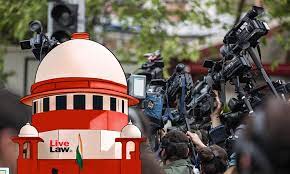NEW DELHI: Noting that police disclosure about criminal cases should not result in a media trial, the Supreme Court on Wednesday directed the Ministry of Home Affairs (MHA) to prepare in three months a comprehensive manual on media briefings by the police on cases under investigation.
“The guidelines must ensure that disclosure does not result in a media trial so as to allow prejudging of the accused. Media trials are liable to result in deflection of cause of justice by impacting the evidence which should be adduced and its assessment by adjudicating authorities,” a three-judge Bench led by Chief Justice of India DY Chandrachud said.
The Bench, including Justice PS Narasimha and Justice Manoj Misra, ordered DGPs of all states to submit their suggestions to the MHA within a month on how to go about preparing the manual. Suggestions from the National Human Rights Commission could also be taken for the purpose, it added. Noting that biased reporting gave rise to public suspicion that the person under probe was, in fact, guilty, the Bench said media coverage often impinged upon the rights of the victims of the crime.
A delicate balance has to be maintained between the media’s fundamental right to free speech and expression; the right of the accused to fair investigation and trial; and privacy of the victim, it said.
The directions came on a PIL filed by People’s Union for Civil Liberties in 1999 on police encounters. While a detailed verdict was passed by the top court in 2014 on police encounters, the modalities for media briefings by the police remained pending.
The top court said any disclosure by the police at a “premature stage” could lead to a media trial affecting administration of justice as it could influence the judge conducting the trial. Noting that there had been an upsurge in reporting on criminal offences in print, electronic and social media since the 2010 guidelines were issued by the MHA, the Bench underlined that there was an urgent need for a standard operating procedure on how journalists should be briefed about cases under investigation. Senior advocate and amicus curiae Gopal Sankaranarayanan submitted a set of guidelines to be considered for framing a manual.
He said while the press could not be restrained from reporting, the sources of information often government entities could be regulated. He cited the 2008 Aarushi Talwar murder case where police officials gave different versions of the incident to the media, creating a suspicion about her parents being the culprits. “We cannot restrain the media from reporting. But the sources can be restrained. Because the source is the state. Even in the Aarushi case, so many versions were given to the media,” Sankaranarayanan said.
The top court said, “At one level, the accused whose conduct is under investigation is entitled to a fair and unbiased police investigation. At the trial stage, every accused is entitled to presumption of innocence and hence media reportage in a manner which implicates the culpability of a person who is under investigation is liable to seriously impinge upon the reputation and personal dignity of the individual.”


